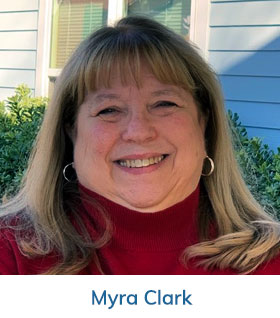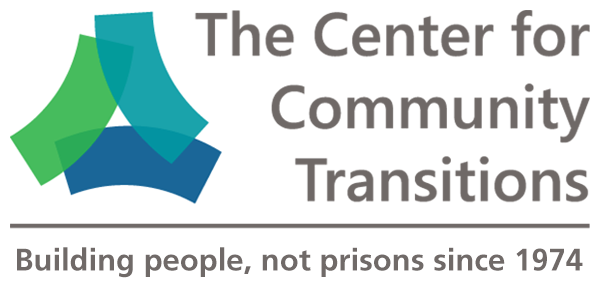Memories with Myra Clark: Looking back on 32 years at CCT

The *Center for Community Transitions began in 1974 in the basement of a church, operating on a $700 annual budget. Under Myra Clark’s leadership, CCT transformed into a $1.7 million organization that’s helped thousands of formerly incarcerated people rebuild their lives and reintegrate as productive members of society.
Every day she came to work, it didn’t feel like actual work. Myra said she “just felt privileged” to do what she was meant to do. For her, there’s a simple solution to decrease recidivism: The entire community must do a better job of helping formerly incarcerated individuals reassimilate. If they have better resources and can make better choices, they’re less likely to return to prison.
In June, the heart and history of CCT retired after devoting 32 years to individuals and families affected by incarceration. While Myra claims she’s a “jack of all trades and master of none” who “merely got out of the way of the staff and allowed them to do the work,” her **remarkable record says otherwise.
In addition to her vision and work with CCT, Myra was a social activist who connected with people across political, legal, religious and employment arenas to change perceptions about people with criminal records.
Compassionate yet direct, collaborative yet accountable, she led our organization with integrity and selflessness for 22 years. Even during Myra’s darkest years – when she learned about her husband’s terminal cancer diagnosis while building the Center for Women during a financial crisis and fighting a lawsuit by a neighboring church – she continued putting one foot in front of the other.
This summer, we took a stroll with Myra down CCT’s memory lane to learn how she got started with advocacy work, the most rewarding part of her job, and what she wishes more people knew about the formerly incarcerated.
CCT: You’re a Spartanburg, SC-native who graduated from the University of North Carolina Charlotte with a BA in psychology and minor in sociology. How did your post-college experiences lead you to CCT?
Myra: I didn’t have a mapped out plan for what I would do and never worked a job more than a couple of years before coming to CCT. I worked at Thompson children’s home and The Relatives, waited tables, bartended, sold beepers, ran a beer and wine store, ran support groups, and volunteered at Woman Reach, a nonprofit that helped women going through life transitions. All of these roles – accounting, sales, personnel, inventory, residential, counseling and interpersonal relationships – prepared me for being an executive director.
I started as a CCT volunteer for a couple of years, stuffing envelopes and answering phones. During that time, I learned the organization helped men who were leaving prison find housing and work, and that CCT took families to prisons for visitations with loved ones.
Jim Plumely (then executive director) called me one day and asked if I could stay over at the Center for Women because he was short-staffed. I got there late when most of the women were in their beds. There was a room set up with a bed and light for staff to sleep overnight. I had no idea who was in the house or what crimes they had committed. I assisted several more times and Jim eventually asked me to be the program director. I had just remarried that year and discussed it with my husband, Carl, who was fully supportive.
“When I first came to work at the women’s facility, I had no idea what I was walking into. I didn’t know anything about the criminal justice system. I just knew I wanted to provide women with an opportunity to find themselves and live a better life.”
When I first came to work at the women’s facility, I had no idea what I was walking into. I didn’t know anything about the criminal justice system. I just knew I wanted to provide women with an opportunity to find themselves and live a better life. I ended up taking a corrections class at Central Piedmont Community College to try to figure this stuff out.
CCT: Has anyone close to you ever been incarcerated?
Myra: When I was 26 or so, I found out my grandfather served time in prison for stealing cars and was addicted to morphine. It was a big family secret. I also had a second cousin who was incarcerated. It makes me think “There by the Grace of God” because when I was young, I made bad choices, experimented with drugs and drove drunk. I met a resident whose boyfriend died in a drunk driving accident in which she was the driver – that could have been me at one time. I was fortunate the experience of arrest and incarceration was not for me – my path was different.
CCT: What were the early days like at the Center for Women?
Myra: We had a lot of growing pains and ran very lean. When I was hired, CCT had $600 in the bank and stayed afloat thanks to a board member’s loan. I had a lot of autonomy running the facility as long as I knew where everyone was and followed prison rules. At the time I didn’t know what the ***Norway prison system model was, we just acted as humanely as possible and treated the women as people. Things were looser then. We called each other by our first names. Residents couldn’t go shopping by themselves, but they could walk to AA meetings about 10 blocks away.
“CCT had $600 in the bank and stayed afloat thanks to a board member’s loan.”
I remember the first resident escape. I wanted to provide closure with the other residents, so I told the resident the night before that she would be sent back to prison the next morning. I don’t even remember why now, but she left and wasn’t captured for 6 months. I learned I couldn’t do that and ever since, residents aren’t told until the time of transfer.
CCT: What kept you motivated and focused for so many years?
Myra: I had to be compassionate but tough. We followed the perceptual control theory of “behavior is the control of perception.” CCT’s motto of “we help create the condition, situation or space for clients to learn and change” is an integral part of who we are. We, as staff, don’t give clients advice. We’re responsible for teaching them how to think through their options in different ways, so if anything ever happened, it would be because of a decision they made. We could help create the conditions and space for the residents to change, but the responsibility was on them. I also went to Al-Anon for four years, which helped me separate myself from their choices. I learned how to let it be.
“CCT’s motto of ‘we help create the condition, situation or space for clients to learn and change’ is an integral part of who we are.”
CCT: What are some of the biggest obstacles CCT faced in its early years?
Myra: Getting people to pay attention to the needs of those incarcerated, securing adequate funding and balancing the expense of serving clients and fundraising (still a challenge today!) and getting people to understand the differences between incarceration for men and women.
It was also a challenge to find second chance employers and opportunities for housing – also still issues today. In the beginning, we kept a list – those who wanted to help formerly incarcerated folks but wanted to do it quietly. This started to change in 2004 when President George W. Bush talked about second chances and prisoner reentry in his State of the Union Address.
CCT wasn’t even on Mecklenburg County’s radar until around 2010 when I went before the commissioners to talk about what we were doing. I had invited a lot of people from our network and asked those in the room to stand up if they were working on reentry issues. One of the people who stood up was (now retired) Superior Court Judge Yvonne Mims Evans. I think it surprised everybody there were so many people working on reentry issues. That helped bring it to light, which was really good for the county.
CCT: What do you wish more people understood about those who’ve been incarcerated?
Myra: Not everyone is a criminal in perpetuity. For many, it’s situational and the choice they made to get incarcerated was the only choice they saw at the time. That’s why we focus our work on helping clients see there are many other choices and to take a pause to think through those choices.
Some people also look at those with criminal records as pariahs of communities who have nothing to offer because they broke the law. But in fact, they have so much to offer. I used to start my education and outreach talks by asking the audience what Malcolm X, Tim Allen, Steve Earle and Charles Dutton have in common. They all served time and we know them for what they did after that. President George Bush was arrested and had a record. Woody Harrelson, Keanu Reeves and Torrey Smith all had a parent who was incarcerated. Today, very few people have escaped knowing someone who is or has been incarcerated.
CCT: You were a newlywed when you started with CCT. What did your husband think about your unconventional career?
Myra: We didn’t have children and we both were doing exactly what we wanted to be doing. He was a political consultant and I had the opportunity to work at CCT. We were both following our bliss and mission in life. He was incredibly supportive through all the years he was alive. I believe there are other people who would not have been accepting or understanding of their spouse working with this population or responding to middle of the night emergencies.
When Hurricane Hugo came in September 1989, our arrangement was I would take a nap and Carl would wake me when the weather took a turn. He woke me up at 3 a.m. and said, “It’s going to get bad.” He knew I only had one staff person and 20 residents at the women’s facility who would be scared to death. I remember driving to the facility in the storm, hunkering down in the safest place and riding it out with all the women.
The next morning it was a mess everywhere, so the residents went out and started cleaning the yard. There was a little old woman who lived in a house behind us who must have slept through the whole thing because she came outside and said, “I don’t know what happened here or who messed up my yard.” Bless her heart, it was so funny. We all laughed and then the residents helped clean up her yard.
CCT: What are some of the best memories you’ll carry with you?
Myra: The most enjoyable part of my job was seeing the light bulb go off in clients’ heads when they discovered different ways of thinking and behaving. I think the most important stories are the people who quietly go on and live their lives. I’ve heard so many stories of how they became parents, grandparents, valuable employees, or how they picked themselves up again. I remember a LifeWorks! client sitting in my office and crying one day because it was the first day of school and he was able to walk his son to school for the first time. I remember the mother who with the help of our partners, bought her own home, graduated from a 4-year college and found a good job, and the man who called to say he still had his job and was going to school.
These successes may not seem extraordinary, but they are. The people CCT serves accomplished this beyond the systemic poverty, racism and an unfair justice system we still battle today. These are the successes of people who overcame an education system that abandoned them and a health care and mental health system that was too complicated to navigate.
Seeing people change and grow was what motivated me the most. We had one client I’m friends with on Facebook who I’ve known for nearly 20 years. She’s an amazing person who makes a good salary, travels a lot and even drives a better car than I do. But she was incarcerated five times before she turned her life around. She’s the reason I tell people to never give up – because you never know when something’s going to happen, when it’s finally going to catch.
CCT is a place where those who have been incarcerated can find friends, a place to be challenged to grow, and be the people they choose to be. It’s been an honor for me to be part of their journey.
*CCT’s original name was ECO – Ex Convicts Organization and later, Energy Committed to Offenders. In 2007, the name changed from ECO to The Center for Community Transitions to better reflect our organization’s mission and goals.
**During her time as executive director, Myra earned certificates in nonprofit management, leadership in nonprofit management and organizational development. This training paved the way for numerous leadership roles: Homeless Services Network of Charlotte-Mecklenburg (president); Mecklenburg Opportunities for Reentry Network (co-founder and president), Council of United Way Agency Executives (board member), United Way of Central Carolinas (board member), Mecklenburg Board of Elections (precinct judge) and Gov. Beverly Perdue’s StreetSafe Task Force to Reduce Repeat Offenders (member). In 2012, Myra was one of five selected for the sabbatical program with the Z. Smith Reynolds Foundation. The following year she was the 2013 Liberty Bell Award Recipient from the Mecklenburg County Bar. The prestigious award is given to non-attorneys who contribute to the criminal justice system through community service work.
***Norway has one of the lowest incarceration and recidivism rates in the world. It takes a healthy rehabilitation approach rather than a punitive “lock-up” approach.

